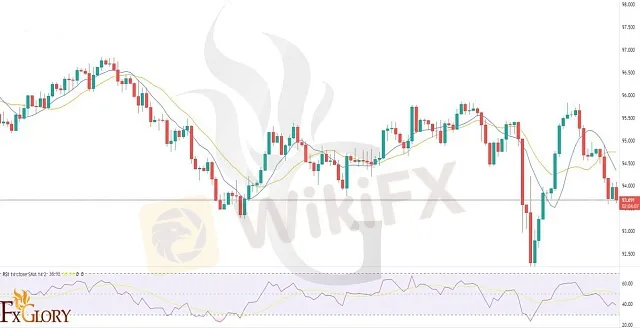AUDJPY analysis for 03.08.2023
Abstract:On the 4-hour timeframe for AUDJPY, the RSI smoothly shifted below the centerline, signaling a potential bearish bias. Recent price action displayed a sharp bearish movement followed by an equally sharp bullish trend. Furthermore, the shorter moving average crossing below the longer moving average confirms a potential downtrend. Traders should exercise caution and closely monitor price movements for potential selling opportunities.

On the 4-hour timeframe for AUDJPY, the RSI smoothly shifted below the centerline, signaling a potential bearish bias. Recent price action displayed a sharp bearish movement followed by an equally sharp bullish trend. Furthermore, the shorter moving average crossing below the longer moving average confirms a potential downtrend. Traders should exercise caution and closely monitor price movements for potential selling opportunities.
• There is a resistance level at 95.840; followed by resistance at 95.676 and 95.310.
• There is a support level at 92.213. Below, there are 92.785 and 93.244.


Read more

Broker Comparsion: FXTM vs AvaTrade
FXTM and AvaTrade are two well-established online brokers offering forex and CFD trading across global markets. Both enjoy strong reputations and high ratings on WikiFX—FXTM holds an AAA overall rating, while AvaTrade scores 9.49/10, indicating they’re regarded as reliable choices by the community. However, since brokers have great reputation in the industry, how do we know which one is more suitable for individuals to invest in? Today's article is about the comparison between FXTM and AvaTrade.

Shocking Move: Yen Breaks Past 140 Barrier!
The yen's breakout above the 140 mark has caught global attention, and the reasons behind it are more than technical.

FINRA fines SpeedRoute for alleged rule violations
The Financial Industry Regulatory Authority (FINRA) has imposed a $300,000 fine on SpeedRoute LLC for a series of supervisory, risk management, and anti-money laundering (AML) program deficiencies spanning from 2017 to the present. Of this amount, $75,000 is payable to FINRA, with the remainder offset by SpeedRoute’s limited ability to pay. In addition to the monetary penalty, SpeedRoute has been censured and ordered to overhaul its compliance framework, including enhancing its written supervisory procedures (WSPs) for market access controls and strengthening its AML program.

Nigeria's Oil Crisis: How Are Stakeholders Responding?
Despite being rich in oil, Nigeria struggles with refining shortages. What’s behind this paradox, and how are different actors reacting?
WikiFX Broker
Latest News
Love, Investment & Lies: Online Date Turned into a RM103,000 Scam
Broker’s Promise Turns to Loss – Funds Disappear, No Compensation!
Broker Took 10% of User's Profits – New Way to Swindle You? Beware!
Pi Network: Scam Allegations Spark Heated Debate
Broker Comparsion: FXTM vs AvaTrade
Account Deleted, Funds Gone: A New Broker Tactic to Beware Of?
El Salvador and U.S. Launch Cross-Border Crypto Regulatory Sandbox
The Instagram Promise That Stole RM33,000
Kraken Partners with Alpaca to Offer U.S. Stocks and Crypto
Before You Trade the Next Big Thing, Remember the Dot-Com Collapse
Rate Calc

